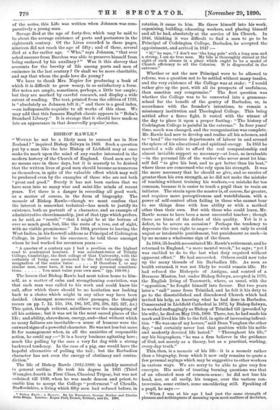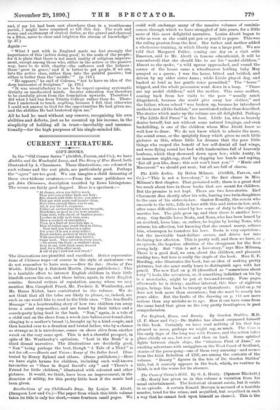BISHOP RAWLE.* " WouLD he not be a likely man
to succeed me in New Zealand ? " inquired Bishop Selwyn in 1868. Such a question put by a man like the late Bishop of Lichfield may at once make its mark upon the mind of any reader interested in the modern history of the Church of England. Good men are by no means rare in these days, but it is scarcely to be desired that the written lives of good men should become as numerous as themselves, in spite of the valuable effect which may well be produced even by the examples of those who are not both "great and good." Surely it has not been useless that we have seen into so many wise and saint-like minds of recent years. Yet there is a danger in recording all good work, as a matter of course, in the form of biography. The memoir of Bishop Rawle—though we must confess that the interest is somewhat technical—has much to justify its existence, both as portrait of a character, and as example of administrative churchmanship, just of that type which prefers, as he said, as "result," "that I might be at the bottom of ever so much good, but, like the roots of a tree, out of sight, with no visible prominence." In 1864, previous to leaving the West Indies, in his farewell address as Principal of Codrington College, in justice to his successor, he told those amongst whom he had worked for seventeen years :—
"A quarter of a century ago I had a position on the highest road to academical honours. I was assistant-tutor of Trinity College, Cambridge, the first college of that University, with the certainty of being soon promoted to the full tutorship on the
resignation of the senior tutor If therefore I, or any similar man, came here, it was not for any personal considera- tions You must value your own men." (pp. 183-88.)
The lesson that Bishop Rawle had most taken home to him-
self, as a matter of calm and strengthening conviction, was that each man was called to his work and could know his call, after which there should be no hesitation nor looking back to a choice which might in any other way have been decided. (Amongst numerous other passages, the thought recurs on pp. 7, 12, 150, 184, 186, 197, 292, 296, 323, 327, &c.) This quiet, though reticent, saintliness was the mainspring of all his actions ; but it was set in the most sacred places of the life; and ability, shrewdness, energy, and—that without which so many failures are inevitable—a sense of humour were the outward signs of a powerful character. He was not less but more fit for management when, in all the anxieties of responsible action, he could say It is a heavy business agitating here ; much like pulling by the ears a very fat dog with a strong backward tendency. In the case of a pig, one would have the hopeful alternative of pulling the tail ; but the Barbadian character has not even the energy of obstinacy and contra- diction."
The life of Bishop Rawle (1812-1889) is quickly narrated in general outline. He took his degree in 1835 (Third Wrangler, fourth in First Class, Classical Tripos), but was not ordained till 1839, when he was made deacon and priest, to enable him to accept the College " preferment " of Cheadle, Staffordshire, a living which fifty men had refused before, in
• Bishop Ramie: a Memoir. By his Execrators, George Mather and Charles John Blagg. London: Regan Peal, Trench, Triihner, and Co. 1890.
rotation, it came to him. He threw himself into his work, organising, building, educating workers, and placing himself and all he had, absolutely at the service of his Church. In 1846, thinking it was difficult to find a man to go to be Principal of Codrington College, Barbados, he accepted the appointment,, and arrived in 1847 :—
" If," he says, "I don't use 'the long pole' with a long arm and, a strong, I am no true man. My bile is thoroughly stirred at the. sight of such abuses in a place which ought to be a model of Church efficiency to all the Colonies. It is disgraceful in the extreme."
Whether or not the new Principal were to be allowed to reform, was a question not to be settled without many tussles, and the very existence of the College was at stake : "I would rather give up the post, with all its prospects of usefulness, than sanction any compromise." The first question was whether the College was to be converted into a grammar- school for the benefit of the gentry of Barbados, or, in accordance with the founder's intentions, to remain a missionary institution and Theological College. This being settled after a fierce fight, it rested with the winner of the day to place it upon a proper footing: "The history of Codrington College is painful in the extreme." In four years' time, much was changed, and the reorganisation was complete.
Mr. Rawle had now to develop and realise all his schemes, and to " head " the various departments of labour in and around the sphere of his educational and spiritual energy. In 1851 he married a wife able to afford the real companionship and almost invisible support so necessary—at least, so invaluable —in the personal life of the worker who never must let him- self fail "to give his best, and to get better than his best," where those are concerned who rely upon his strength. It was the more necessary that he should so give, and so receive of greater than his own strength, as he did not make the mistake of teaching without training his workers,—a mistake far too common, because it is easier to teach a pupil than to train an initiator. The strain upon the master is, of course, far greater, and requires more perceptiveness and watchfulness, with a
power of self-control often failing in those who cannot bear to see things done with less ability or with a method
other than their own. But with those who could learn, Mr. Rawle seems to have been a most successful teacher ; though there are hints of the defect of this quality. Yet is it a defect, to be severe on occasion? Perhaps the tendency to deprecate the true right to anger—the wish not only to avoid unjust or intolerable punishment, but punishment as such—is by no means a wholesome sign of the times.
In 1864, ill-health necessitated Mr. Rawle's retirement, and he returned to England, "a mere mental wreck," he says ; "yet I was enabled to do to the last what duty required without apparent effort." He had succeeded. Others could now take up the many threads of his Barbadian life. As soon as health returned, it was not likely he would remain idle. He had refused the Bishopric of Antigua, and control of a Burmese Mission, but, under Bishop Selwyn, accepted in 1870, the English living of Tamworth, where, as usual, with the "opposition," he fought himself into favour. But two years later a "call" came from Trinidad, and he felt it his duty to go to the disestablished and disendowed Church which had invited his help, as knowing what he had done in Barbados. Consecrated in Lichfield Cathedral in 1872, by Bishop Selwyn, he worked unflaggingly as Bishop of Trinidad till (preceded by his wife), he died on May 11th, 1889. There, too, he had made his mark and lived his life to the full, in spite of increasing "He was one of my heroes," said Dean Vaughan the other day, "and certainly never lost that position while his noble and modestly devoted life lasted." "Throughout his life," say his biographers, "he was a firm believer in the guidance of God, not merely as a theory, but as a practical, working, every-day truth."
This, then, is a memoir of his life : it is a memoir rather than a biography, from which it now only remains to quote a few personal sayings which may be suggestive to other workers in various ways. We are sorry to be able to give very few excerpts. His mode of treating burning questions was that of an educated man of common-sense : he did not lose his head, nor, at all easily, his temper, over the various con- troversies, some extinct, some smouldering still. Speaking of a pupil, he says :—
"When I was at his age I had just the same strength of phrases and nothingness of meaning upon most matters of doctrine,
and, if my lot had been cast elsewhere than in a troublesome parish, I might have remained so till this day. The work and worry and excitement of clerical duties, as the gravel and charcoal in a filter, serve to clear and brighten the stream of knowledge." (p. 27.) Again "What I met with in England made me feel strongly the importance of this [active doing good] to the souls of the people ; for it is plain that there is not much reality of religious improve- ment, except among those who, either in the active or the passive way, have to do with charity—the sufferers and the helpers : these 'grow in grace,' and it is better to get people, if we can, into the active class, rather than into the painful passive ; but either is better than the ' middle.' " (p. 113.) "He appears," he said of Colenso, "not to have an idea of the deep harmonies of Scripture." (p. 176.) "It was unsatisfactory to me to be superi,nposing systematic divinity on uneducated minds. Secular education was therefore to be carefully given from the foundation upwards. Therefore I did what I had run from Trinity College rather than do. There- fore I undertook to teach anything, because I felt that otherwise I could not answer to God for the opportunities He had given me, and the abilities He had bestowed upon me."
All he had he used without any reserve, recognising his own abilities and defects, just as he counted up his income, in the simplicity of holding all in trust—inevitably and unsensa- tionally—for the high purposes of his single-minded life.











































 Previous page
Previous page